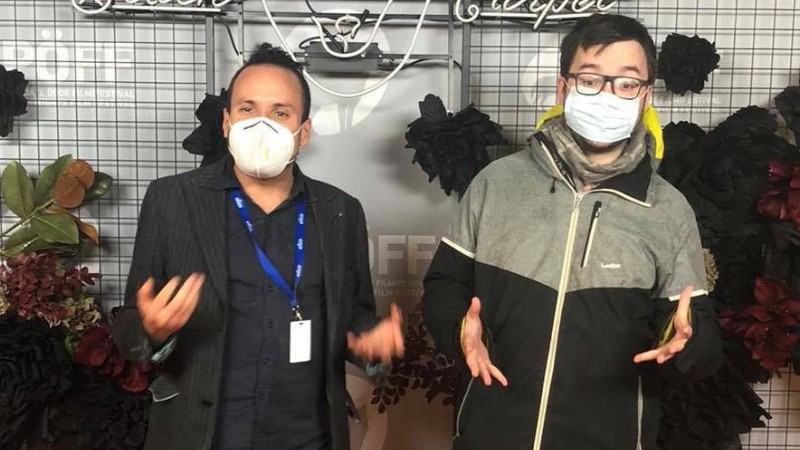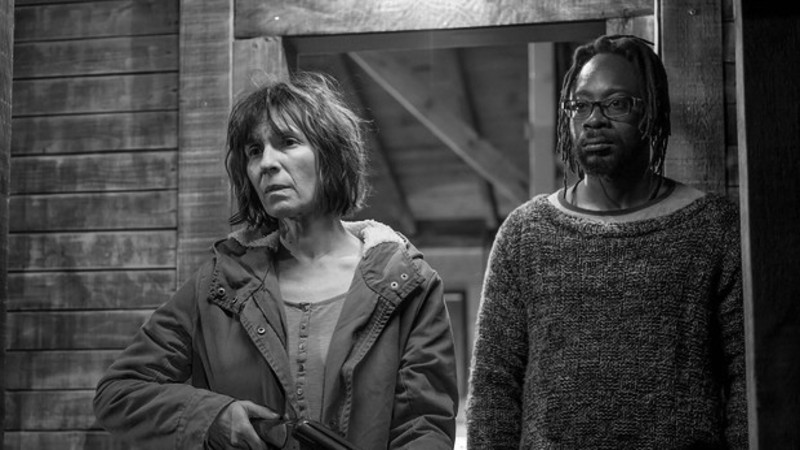QUICK AND DIRTY: LIVE FROM TALLINN
The soothing sound of water precedes the first image in Spanish director Miguel Faus’, The Quiet Maid. Then, appears the Spanish coast bathed in sunshine, the turquoise sea with trees in the foreground, forming a type of proscenium frame. Then, the sound of someone climbing a ladder and a maid appearing to attend to one of her many chores. It turns out the view is through a window.
Away from the British tourist hotspot of the Costa Brava, Ana (Paula Grimaldo), a newly employed Columbian maid, arrives at the luxurious vacation home of her employers, Pedro (Luis Bermejo) and Andrea (Ariadna Gil). She inconspicuously goes about her work as instructed, sending her wages home to her mother, to pay for her younger sister to study medicine. Befriending Gisela (Nany Tovar), a servant for a neighbouring family, her hopes are dashed that her employers will be able to sort her contract and papers once her probation is up. Frustrated by their empty promises and the shitty wages, Gisela lures Ana into sneaking out to parties at night, where they risk drinking too much. Gradually, she becomes mischievous, finding ways to enjoy her lavish surroundings, while feeding the cats that annoy Pedro, who complains they ruin his garden vegetables.
The pre-title image is unnecessary, unless it’s making a point. The next image of Ana, in the backseat of a car, arriving at the summer home is an appropriate beginning. However, watching Ana against a paradisal background, reminds us that for some life is pleasure, for others it’s a toil. The opening image lays the groundwork for the film’s themes of inequality and privilege.
Walking around the house, running her fingers along the paintings, Ana’s filled with wide-eyed wonder. There’s a fluidity to The Quiet Maid’s early scenes, where Ana puts herself to the grindstone. Unlike Pedro and Andrea, and their daughter Claudia (Violeta Rodríguez) and son Jacobo (Pol Hermoso), who can move at a casual pace, whether it’s cleaning, cooking or ironing, it feels as if there’s a pressure for Ana to be in perpetual motion.
In one scene, Ana speaks to her mother on the phone while ironing. This is juxtaposed with Claudia on her phone, idly sunbathing and tickling her stomach. At dinner Ana waits on the family, jumping to attention to clear the plates when the bell rings. In another scene, when Jacobo catches her smoking, she acts as though she has done something wrong. Faus returns to this initial idea of pleasure versus toil, and the fruits of absent labour Claudia and Jacobo enjoy.
The drama is playful, as the conflict between Ana and her employers takes some interesting and subtle turns. The conversation with Gisela is when the seeds of discontent are sown. Ana’s ignorant bliss or belief in her employers, who she describes as “good people”, begins to fade. She’s aware of how far off she is from covering her sister’s tuition fees. Again, the director is drawing comparisons between those that have and those that don’t, and the glaring inequality of opportunity to rise above one’s station in life. However, he doesn’t exclusively condemn people in positions of privilege, through a little twist in this narrative thread.
There’s a foreignness to the film in which Ana’s relationship with her employers is purely transactional. She serves at their pleasure and should she fall out of favour, she’ll be replaced. Any genuine acts of kindness are fleeting. Claudia is sympathetic when she notices Ana is upset, while Pedro even insists she join them on the boat. Yet, in other scenes, she makes up their beds and scrubs their toilets. The power dynamic is blatantly prejudicial, evidenced when Andrea demands or firmly instructs, instead of asking. Even the boat trip is motivated by an ulterior motive. It’s a means to placate Ana’s inevitable disappointment when her employers realise that they can’t get her papers, by making her feel a part of the family. This is after Andrea is condescending about Gisela, and she spoke like it was in her and Pedro’s power to circumvent Spanish laws. It conveys the casualness towards what’s important to others, that plays on the employer and employee, master and servant dichotomy.
At a glance, The Quiet Maid is a film about class, however, we should see it as an interpersonal war story. True to its title, the contentious relationship between Ana and the family develops quietly. Faus teases us as to what will happen, and even when relations fall apart, the drama is quietened.
The conflict emerges out of the perception of ownership by Ana’s employers, who see her as an asset. When a guilty Ana is told that Gisela was fired for being caught intoxicated, she’s forced to lie to keep her job. Unlike Claudia and Jacobo’s hedonistic lifestyle, who enjoy being young and carefree, Ana is a young, yet mature character with responsibility, who is provoked into rebelliously acting out. She lures a male friend of Claudia’s to the house when it’s vacant under false pretences and has sex on the inflatable flamingo. With a cigarette, she drinks out of a mug that reads, “Breakfast of Champions.” There’s a flippant presence to her that’s a response to the way she has been dehumanised by Andrea and Pedro.
What’s particularly noticeable is the sexual repression. Ana has agreed to work every day in August and feels she can’t leave the premises without permission. When Gisela introduces her to Tinder, her sexual desires are stirred. In an early scene, she signals to Claudia who is sneaking around with a boy, helping her to avoid her parents. She even witnesses Jacobo having sex in the pool, and yet she is condemned, described as a dirty pig by Andrea for having sex when everyone was away from the house for the night.
Andrea’s rhetoric recalls the gradual dehumanising thought process by which we have historically arrived at justifying non-consensual sterilisation of specific groups of people, through unethical government-sanctioned programmes. Faus isn’t so bold as to go there, but how the film flirts with power dynamics, teasing whether Ana can empower herself, especially against Jacobo and his friends, displays not only toxic masculinity, but the toxicity of privilege that empowers patriarchy and dehumanisation and objectification.
Aside from at least one odd bit of plotting, The Quiet Maid is an effective story about Ana’s quiet, almost silent struggle. She’s a compelling character whose internal and quiet self we catch glimpses of. We only see her break out of her timid self-consciousness in moments, like when she embraces her sexuality or stands up to Jacobo and his friends. In these fleeting moments, however, we fall in love with a character who is both a rebel and a responsibly thoughtful person.
Faus plays to the drama, when need be, but downplays it to sustain Ana’s quiet and subtle retaliation, even omitting music for much of the film, which is refreshing. Not only another observation of the class system, and the inequality of the wealth gap that cannot change anything, The Quiet Maid is a playfully entertaining film about one woman’s empowering journey, exploiting the arrogant shortcomings of the upper class.
The Quiet Maid just premiered in the First Feature Competition of the 27th Tallinn Black Nights Film Festival.










